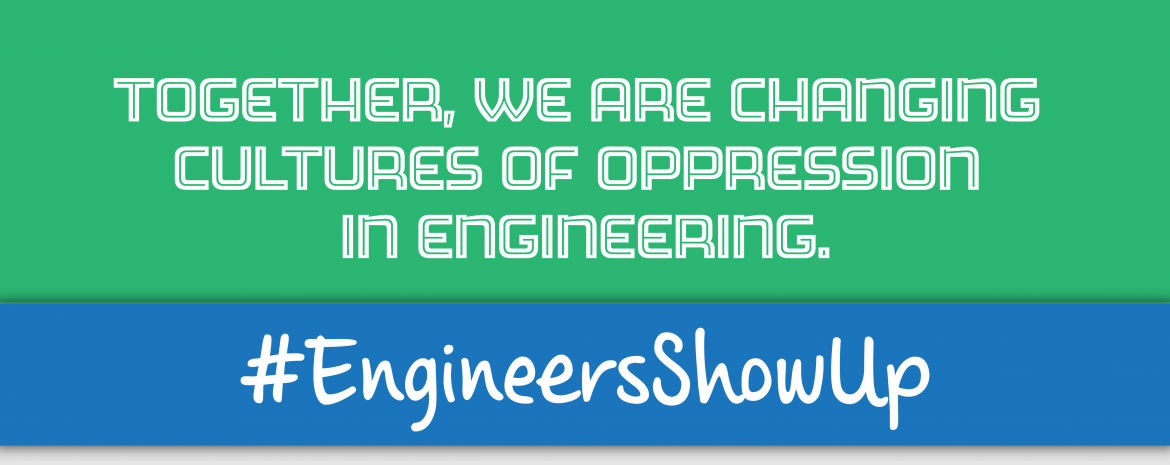#EngineersShowUp Update
#EngineersShowUp
by Ellen Foster and Donna Riley
Engineering apathy is a professional norm. As the old joke goes, “Engineers’ political leanings run toward a corner office and a parking space with their name on it.” Michigan sociologist Erin Cech has documented how engineers undergo a process of depoliticization through their undergraduate education and professional formation.
When engineers witness injustice in our midst, from microaggressions to overt structural racism, ableism, classism, xenophobia, sexism, cis-sexism, or heternormativity, all too often we respond with inaction or silence. Engineers who don’t conform to this apathetic norm can often feel isolated, acting as “lone wolves” in their department or company as they seek to change the status quo.
This past week we kicked off #EngineersShowUp in a Week of Action that represented a conscious attempt to amplify the work of accomplices and allies in the struggle for justice in engineering, deepening our critique of exclusionary engineering cultures, and sharpening our focus on power. WEPAN, NAMEPA and the ASEE Committee on Diversity, Inclusion, and Equity are partnering with us in this effort, and we invite the community to continue to use the hashtag for conversation and to amplify local action. We expect to see the hashtag in use at CONECD and ASEE, and into the fall conference schedule at professional and affinity societies’ meetings.
Can #EngineersDisrupt the apathetic norm and demonstrate how #EngineersShowUp in solidarity with others to dismantle and resist forms of oppression across intersecting identities?
Here are just a few examples we celebrated this week:
- Nora Paul-Schulz, an engineer and high-school teacher, shows up with the Boston Teachers Union’s Unafraid Educators supporting immigrant students and their families, making connections that strengthen resistance to both racism and xenophobia, and working to end the School-to-Prison pipeline and School-to-Deportation pipeline. She is currently working on a campaign around School Police Officers’ reports ending up accessible to federal law enforcement (including ICE and the FBI) and the gang database. Find out more.
- Engineers at Google have been showing up to question the ethics of their company’s contracts with Customs and Border Protection, to oppose its involvement in drone warfare, and to establish stronger worker’s rights. As Noam Scheiber and Kate Conger put it in their recent piece in New York Times Magazine, they “were also organizing to save themselves from Google, where those who didn’t fit the mold of the straight, white, male techie felt they could be too easily marginalized or dismissed.” Over 20,000 workers walked out to protest a $90 million payout to an executive accused of sexual misconduct, and continued to form alliances across the industry.
- Margot Vigeant at Bucknell used her “professional moment” in her thermodynamics class to discuss justice and thermodynamics; her twitter thread reflecting on that experience is well worth a read.
- Briana Benedict and the CDEI PD Virtual Workshop Team hosted a virtual workshop, Engineers Show Up: Let’s Talk About Allyship discussing what it means to act in solidarity with one another, and challenging us to deepen our commitments as allies, advocates, and accomplices.
- Drexel University hosted a panel discussion addressing relations of power in engineering work that engages communities. Panelists called out the shallowness of rhetoric in STEM conversations around diversity and community engagement. In these moments, they asked, who is defining justice and social change?
- Justin Major offered an exercise to help us to think about socioeconomic exploitation within the engineering education research enterprise.
- Logan Williams hosted an Anti-Oppressive Engineering Workplace Guided Visualization Exercise.
- Meagan Pollock led a twitter chat sponsored by ASEE with guest hosts Stephanie Adams, Brianna Benedict, and Jacqueline El-Sayed. Participants pondered what it would look and feel like for engineers to confront power and inequity embedded in the systems and structures in which we act. You can read more by following the hashtag #EngineersShowUp.
If you do follow the hashtag, you’ll notice it comes up full of reports of activity at many other universities including Oklahoma, Purdue, Utah, Penn State, Boise State, CU Boulder, Colorado State, USD, RPI, and UTEP. Activities range from talks and workshops, to amplifying the work of scholars/practitioners of color on local campuses and in the national conversation, to active protests of racist incidents or decisions on campus.
- Boise State hosted Dr. Christine Ortiz to lead a workshop on socially-directed STEM, helping attendees “envision a more inclusive and equitable education system.”
- Utah’s Biomedical Engineering department is hosting an event engaging men in STEM inclusion.
- Oklahoma’s activities included protest, faculty learning communities,and a keynote on “Centering an Indigenous Leadership Perspective” with Dr Robin Zape-tah-hol-ah Minthorn.
- Students at RPI, including the RESET group, organized a career fair during E-week, which invited companies following ethical practices to their campus, giving students an opportunity to find alternative pathways in engineering that align better with their equity and justice commitments. Read more about the event and the students’ motivation here.
How will you show up?
Follow our organizing efforts or get involved by going to www.engineersshowup.org, following us on Twitter @EngShowUp, or emailing roar.for.change.at.scale@gmail.com. You can also find a more in-depth description via this JEE editorial.

